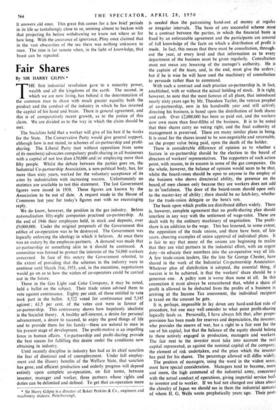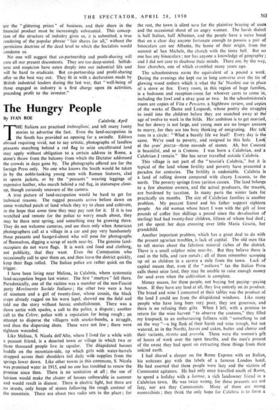Fair Shares
By SIR HARRY GILPIN * THE first industrial revolution gave to a minority power, wealth and all the kingdoms of the earth. The second, in which we are now living, has behind it the determination of the common man to share with much greater equality both the product and the conduct of the industry in which he has invested the capital of his hand and brain. There is general agreement, and this is of comparatively recent growth, as to the justice of this claim. We are divided as to the way in which the claim should be met.
:The Socialists hold that a worker will give of his best if he works for the State. The Conservative Party would give general support, although how is not stated, to schemes of co-partnership and profit- sharing. The Liberal Party (not without opposition from some of its members) advocates compulsory profit-sharing in all businesses with a capital of not less than £50,000 and/or employing more than fifty people. Whilst the debate between the parties goes on, the Industrial Co-partnership Association, a non-political body, has, for more than sixty years, worked for the voluntary acceptance of its aims by industrialists with increasing success. Unfortunately no statistics are available to test this statement. The last Government figures were issued in 1938. Those figures are known by the Association to be out of date. A request made in the House of Commons last year for today's figures met with no encouraging reply.
We do.know, however, the position in the gas industry. Before nationalisation fifty-eight companies. practised co-partnership. At the end of 1946 their employees held, in stock -and deposits, over f9,000,000. Under the original proposals of the Government this edifice of co-operation was to be destroyed. The Government was logically enforcing the ideology in which it believes. At once there was an outcry by the employee-partners. A demand was made that co-partnership or something akin to it should be continued. A committee was formed to protect the interests of the 54,000 workers concerned. In face of this outcry the Government relented, to the extent of providing that the schemes in the industry were to continue until March 31st, .1951, and, in the meantime, negotiations would go on as to how the wishes of co-operators could be carried out in the future.
Those in the Gas Light and Coke Company, it may be noted, held a ballot on the subject. Their trade union advised them to vote against continuance. Eighty per cent. of those entitled to vote took part in the ballot. 8,522 voted for continuance and 5,145 against ; 61.5 per cent. of the votes cast were in favour of co-partnership. This controversy shows how hopelessly idealistic is the Socialist theory. A healthy self-interest, a desire for personal advancement, a desire to succeed, to enjoy the good things of life and to provide them for his family—these are natural to man in his present stage of development. The profit-motive is an impelling force in human affairs. Co-partnership and profit-sharing provide the best means for fulfilling this desire under the conditions now obtaining in industry.
Until recently discipline in industry has had as its chief sanction the fear of dismissal and of unemployment. Under full employ- ment and the illusory benefits of the. Welfare State, that sanction has gone, and efficient production and orderly progress will depend entirely upon complete co-operation, on fair terms, between investor, manager and worker, three partners whose' rights and duties can be delimited and defined. To get that co-operation more * Sir Harry Gilpin is a director of Baker Perkins & Co., engineers and machinery makers, Peterborough. is needed than the patronising hand-out of money at regular or irregular intervals. The basis of any successful scheme must be a contract between the parties, in which the financial basis is fixed by an enforceable agreement and the participants are assured of full knowledge of the facts on which a distribution of profit is made. In fact, this means that there must be consultation, through- out the year, at every level and that information as to every department of the business must be given regularly. Consultation must not mean any lessening of the manager's authority. He is the captain of the team, and, in the end, must give the orders; but if he is wise he will have used the machinery of consultation to persuade rather than to command.
With such a contract and such practice co-partnership is, in fact, established, with or without the actual holding of stock. It is, right, however, to note that the most famous of all plans, that introduced nearly sixty years ago by Mr. Theodore Taylor, the veteran prophet of co-partnership, now in his hundredth year and still actively directing his business, is based upon the distribution of both shares and cash. Over £2,000,000 has been so paid out, and the workers now own more than four-fifths of the business. It is to be noted that their shares carry no voting right, and the final authority of management is preserved. There are many similar plans in being. It is usual for the shares issued to be non-negotiable and returnable, on the proper value being paid, upon the death of the holder.
There is considerable difference of opinion as to whether a feature in co-partnership should be the election to the board of dtrectors of workers' representatives; The supporters of such action point, with reason, to its success in some of the gas companies. On the whole, however, the balance of opinion would seem to be that, whilst the board-room should be open to anyone in the employ of the business who shows directorial ability, -the presence on the board of men chosen only because they are workers does not add to its 'usefulness. The door of the board-room should open only to the master-key of ability ; there should be no latch-key, whether for the trade-union delegate or the boss's son.
The basis upon which profits are distributed differs widely. There is, however, complete agreement that no profit-sharing plan should interfere in any way with the settlement of wage-rates. These are dealt with by the ordinary machinery of negotiation. The profit- share is an addition to the wage. This has lessened, to some extent, the opposition of the trade unions, and there have been, of late years, cheering examples of union approval of individual plans. It is fair to say that many of the unions are beginning to realise that they are vital partners in the industrial effort, with an urgent duty—to educate their members into the co-operative way, of life. A few trade-union leaders, like the late Sir George Chester, have shared in the work of the Industrial Co-partnership Association. Whatever plan of distribution is adopted, the essential thing, if success is to be achieved, is that the workers' share should be a generous one. A paltry sum is worse than none at all. In this connection it must always be remembered that, whilst a share of profit is allowed to be deducted from the profits of a business in arriving at the Income Tax assessment, the individual recipient is taxed on the amount he gets.
It is, perhaps, impossible to lay down any hard-and-fast rule of procedure, but one may well consider to what point profit-sharing logically leads us. Personally, I have always felt that, after proper provision has been made for reserves and depreciation, the investor, who provides the sinews of war, has a right to a fair rent for the use of his capital, but that the balance of the equity should belong to those actively engaged in production, managers and workers. The fair rent to the investor must take into account the real capital represented, as against the nominal capital of.the company, the element of risk undertaken, and the price which the investor has paid for his shares. The percentage allowed will differ widely.
The position of managers, using the word in the widest sense, must have special consideration. Managers tend to become,' more and more, the high command of the industrial army, concerned with the actual conduct of operations, giving impartial service both to investor and to worker. If we had not changed our ideas about the chivalry of Japan we should see in them the industrial samurai of whom H. G. Wells wrote prophetically years ago. Their. posts
are the "glittering prizes " of business, and their share in the financial product must be increasingly substantial. This concep- tion of the structure of industry gives us, it is submitted, a true rendering of the popular phrase " fair shares for all," without the pernicious doctrine of the dead level to which the Socialists would condemn us.
No one will suggest that co-partnership and profit-sharing will cure all our present discontents. They are too deep-seated. Selfish- ness and suspicion have eaten deeply into our industrial life and will be hard to eradicate. But co-partnership and profit-sharing offer us the best way out. They fit in with a declaration made by British industrial leaders during the last war, that "well-being of those engaged in industry is a first charge upon its activities. preceding profit to the investor."











































 Previous page
Previous page